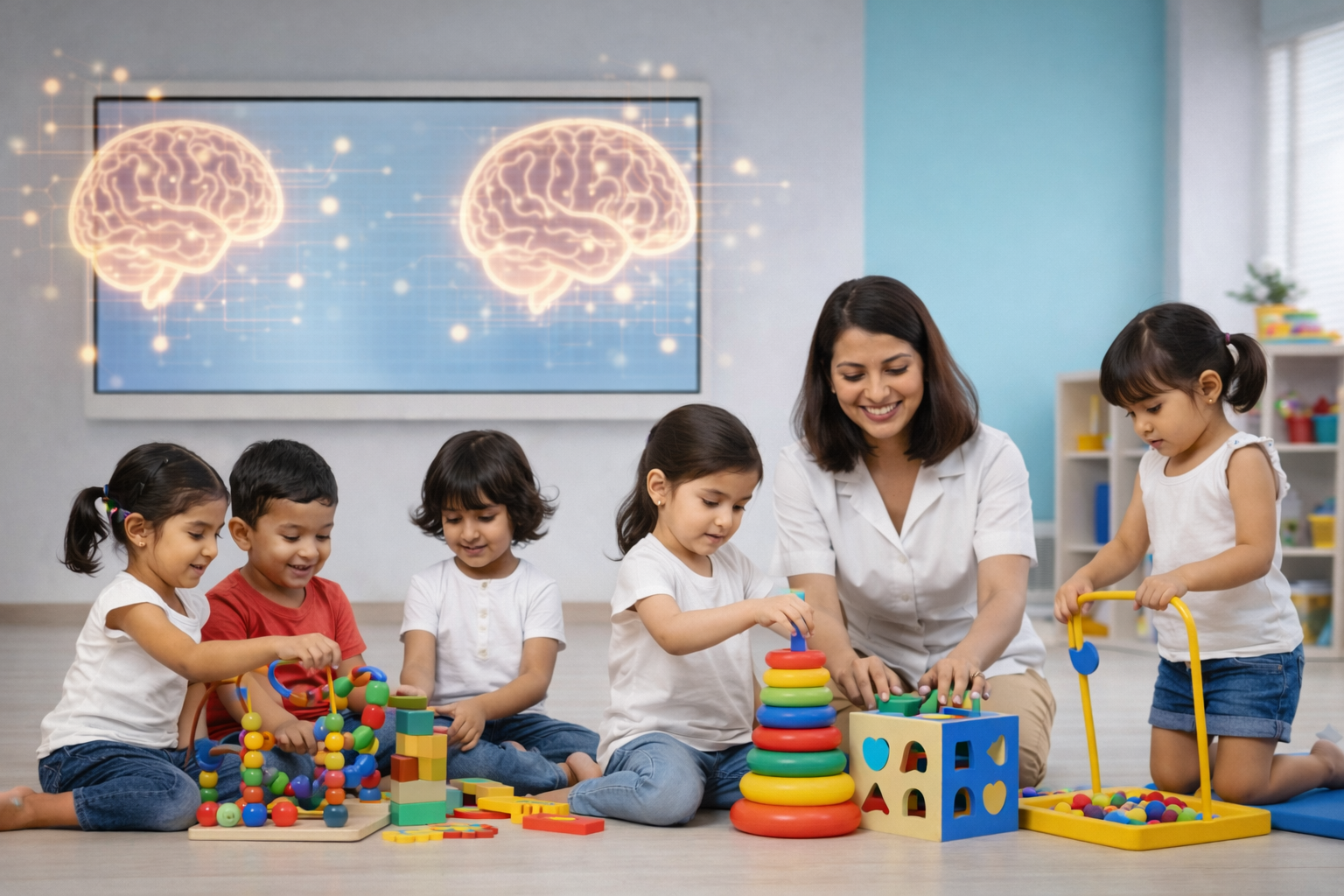Autism Spectrum Disorder (ASD) is often mistakenly seen as something that only affects children. The truth is, autism is a lifelong condition it doesn’t just fade away as we age; instead, it transforms in how it manifests. What might start as communication delays or social interaction difficulties in early childhood can develop into challenges related to school, friendships, work, or living independently.
Every individual’s experience is different, but one thing is clear: recognizing autism early and providing ongoing support can make a world of difference. With the help of a knowledgeable Autism Doctor and tailored Autism Therapy, families can help their children grow into confident, capable adults.
At Samvedan Child Development Center, Dr. Purva Shah and her dedicated team offer families compassionate, evidence-based care that adapts to each stage of development—because autism is not just a point in time; it’s a lifelong journey.
Early Childhood: Identifying the Initial Signs
Parents often find themselves as the first to pick up on signs of autism in their child. These signs can include:
-
Limited eye contact
-
Delayed speech or a complete lack of speech
-
Repetitive actions like hand-flapping or organizing toys
-
Not responding when their name is called
-
A strong preference for routines and struggles with changes
Initially, these behaviors might seem minor, leading some parents to brush them off as just a phase. However, getting an early evaluation from an Autism Doctor is essential. A timely diagnosis paves the way for targeted Autism Therapy, which can greatly enhance developmental outcomes.
For example, speech therapy can improve communication skills, while occupational therapy can tackle sensory issues. Play-based interventions also promote social skills in a safe and nurturing environment. The sooner these therapies begin, the better the foundation for long-term growth.
School Years: Balancing Learning and Social Development
When kids with autism start school, they encounter a whole new set of challenges. The academic environment becomes more structured, and interactions with peers take on greater significance in their daily lives. Some children might shine in subjects like math, art, or technology, yet find themselves struggling with social cues or the routines of the classroom.
This is where individualized education plans (IEPs) come into play. A knowledgeable Autism Doctor often collaborates closely with teachers to create strategies that cater to the child’s unique strengths and challenges. Regular Autism Therapy during these formative years is crucial for helping children build resilience, enhance problem-solving skills, and foster independence.
For instance, social skills groups provide a space for children to practice communication in real-world situations, while behavioral therapy equips them with tools to manage feelings of frustration or anxiety. These interventions not only boost academic performance but also cultivate confidence and emotional development.
Adolescence: Facing New Realities
The teenage years can be tricky for any child, but for those on the spectrum, they often bring even more challenges. Puberty, social pressures, and the quest for independence can lead to:
-
Increased anxiety
-
A heightened awareness of feeling “different”
-
Struggles with identity and self-esteem
-
Difficulties in forming or maintaining friendships
Families often find this phase overwhelming, but they don’t have to go through it alone. Support from a skilled Autism Doctor ensures that therapy evolves to meet the teen’s changing needs. During adolescence, Autism Therapy typically emphasizes emotional regulation, self-advocacy, and preparing for adult responsibilities.
Dr. Purva Shah often highlights the importance of involving teenagers in their own care. When adolescents gain insight into their strengths and challenges, they can develop more effective coping strategies and feel a greater sense of ownership over their progress.
Adulthood: Transitioning Into Independence
Reaching adulthood is a significant milestone, but it can feel overwhelming for individuals with autism and their families. They often face challenges like finding a job, pursuing higher education, managing daily tasks, and building relationships.
However, contrary to popular belief, many adults with autism can truly thrive when they receive the right support. Ongoing Autism Therapy can focus on practical skills such as:
-
Job training and effective workplace communication
-
Time management and understanding finances
-
Developing healthy personal relationships
-
Independent living skills like cooking, shopping, and using public transportation
An experienced Autism Doctor, like Dr. Purva Shah, can create personalized care plans for adults, ensuring that therapy aligns with their unique goals and aspirations. Families also gain from continuous counseling, as the transition from active caregiving to promoting independence requires fresh strategies.
The Lifelong Value of Therapy and Guidance
A common misconception about autism is that therapy stops once childhood is over. In truth, the need for support evolves but never really goes away. Autism Therapy offers ongoing tools that individuals can use to navigate various environments from classrooms to workplaces, and from family life to community interactions.
Equally crucial is having a trusted Autism Doctor who ensures that interventions stay effective and relevant. Regular check-ins, reassessments, and updates to therapy plans help maintain progress, even as new challenges come up.
At Samvedan Child Development Center, we take a holistic approach: blending therapy, medical expertise, and family support to nurture not just the individual but the entire network surrounding them.
Tips for Families Supporting Loved Ones With Autism
Supporting a child or adult with autism requires patience, understanding, and practical strategies. Here are some tips Dr. Purva Shah often shares with families:
-
Celebrate strengths, not just challenges. Many individuals on the spectrum excel in creative or analytical fields encourage these talents.
-
Maintain consistent routines. Predictability reduces stress and helps individuals feel secure.
-
Encourage open communication. Even if verbal speech is limited, find other ways like visuals or technology to express thoughts and feelings.
-
Prioritize self-care for caregivers. Parents and siblings also need support to avoid burnout.
-
Stay informed and flexible. Autism research evolves, and so do therapy approaches stay open to new tools and ideas.






